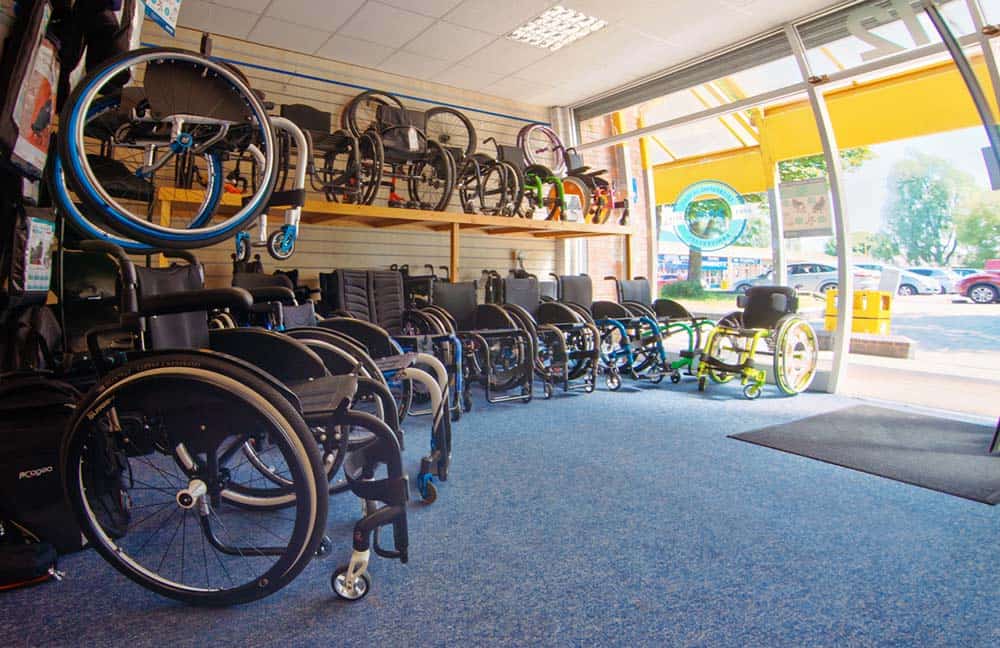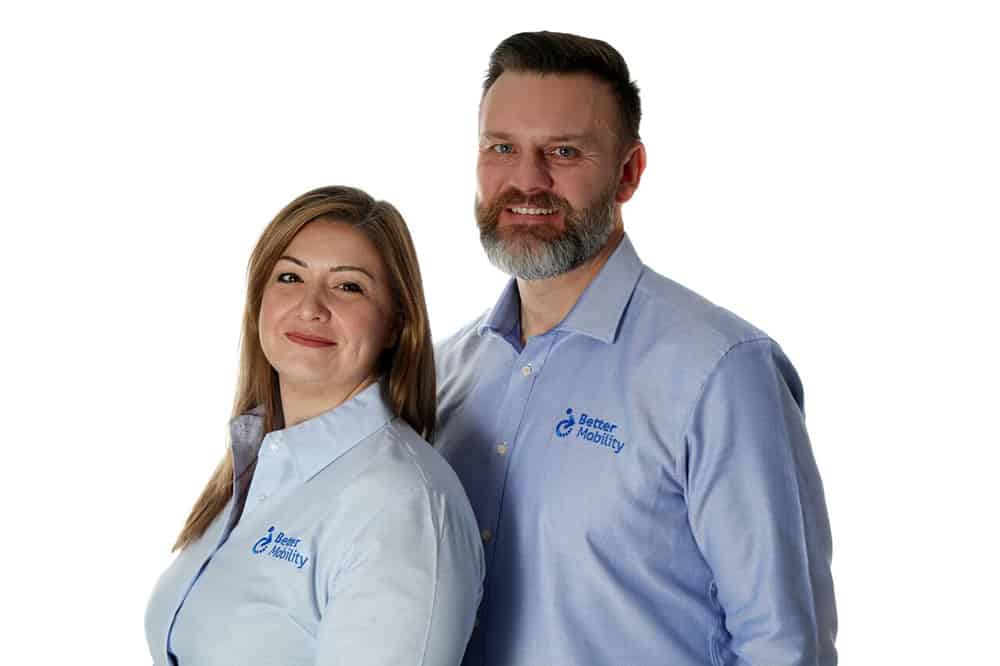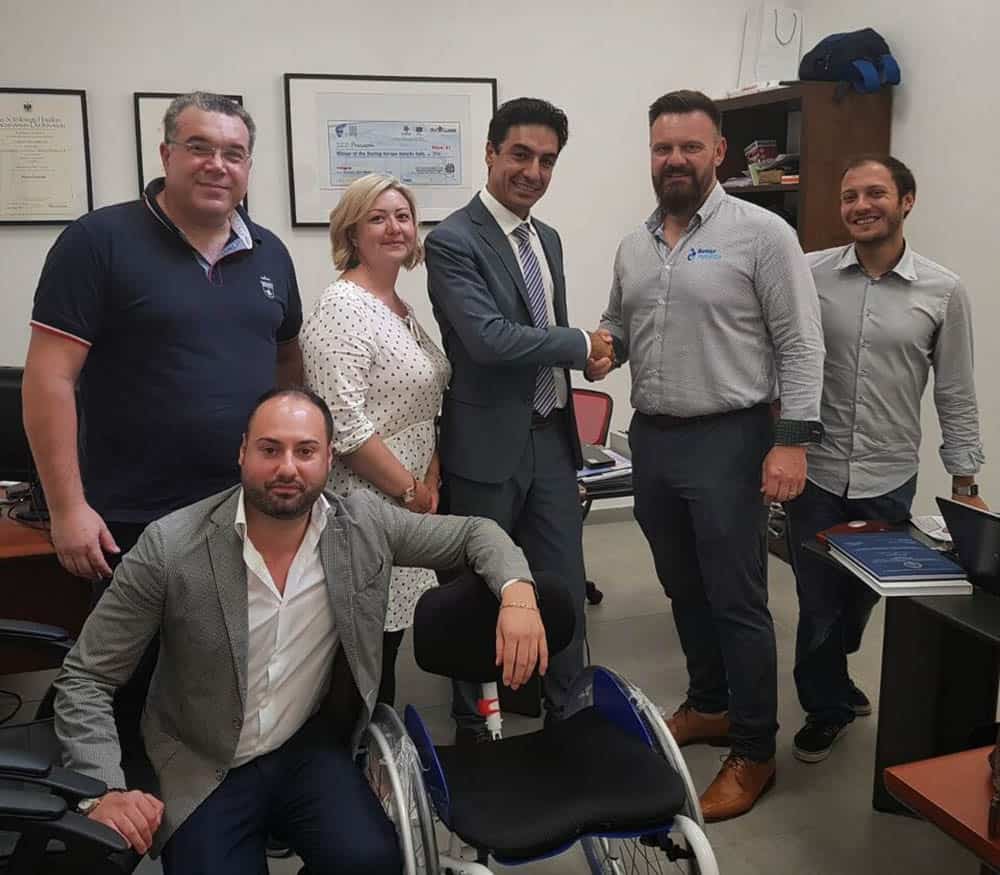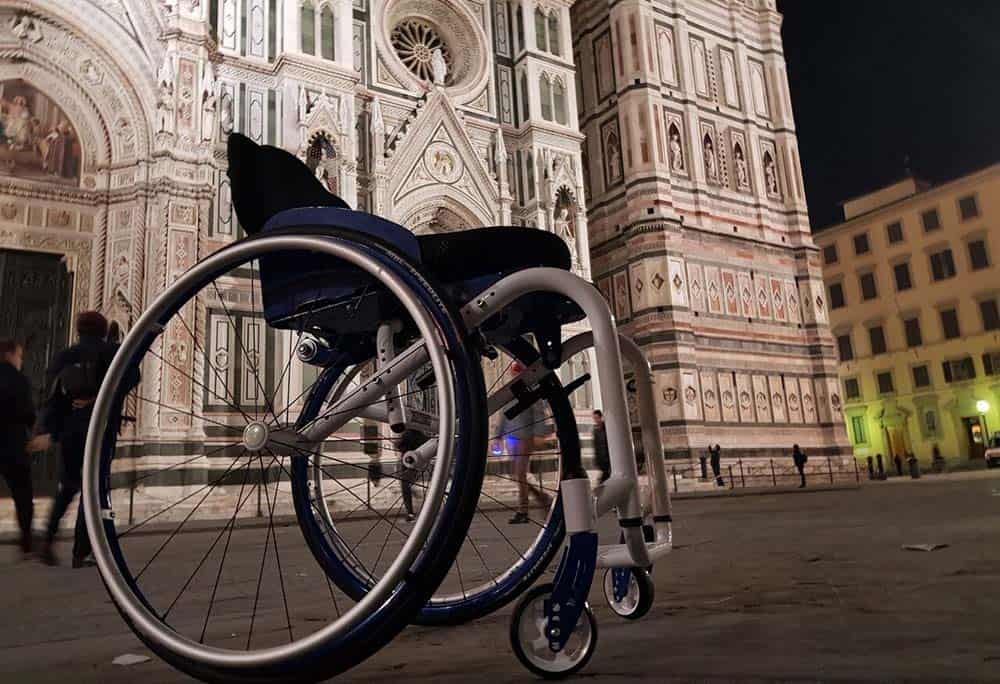Retailer Spotlight: Better Mobility
Better Mobility: Opening the Pandhora’s box of distribution
Traditionally, companies and consumers would find out about new innovation through visiting trade shows or reading about it in relevant publications, however, one retailer has shown how the world of social media is providing a new avenue for end-users and dealers to discover fresh innovations. Jeanette Warner, Director of Better Mobility and the Chair of the British Healthcare Trades Association’s Mobility Group section, discusses the retailer’s first foray into distribution with Pandhora, an innovative Italian wheelchair it discovered online.
Pandhora are a new one to us, how did you first become aware of the company?
We have got an incredible guy who we employ through his company to do all of our website, marketing and social media.
Part of what he does is point out companies to us that are doing some really interesting stuff and attracting a lot of attention online and on social media, such as Pandhora.
The online world is so important today and it is something a lot of dealers, especially independent dealers, make the mistake of trying to do themselves I think.
It is interesting that it was social media that first made you aware of Pandhora, do you find social media is becoming more important in the world of mobility?
Over the past recent years, maybe since the Olympics in London, people in wheelchairs are being seen differently in society. There has been a shift of people’s perspectives of those in wheelchairs and people with disabilities, which, as the mother of a disabled son, really is phenomenal to see.
It also means that people are starting to shout from the rooftops and online when they find something they like and those people were shouting about this chair, so we thought we need to have a look at that.
This community is so vocal and vibrant on social media so it is something that really can’t be ignored and should be embraced.
How did you know Pandhora’s product was one you wanted to distribute?
Being a relatively small company, we like to keep things personal and decided to travel to Italy to visit Pandhora. The company had been in talks with some other UK dealers but no one had been out to see them or the product.
We met the Pandhora team, saw the factory, spent the day with them and we were really impressed by the product’s ingenuity and the fact that it is slightly different to everything else on the market.
My husband Lee, our senior most seating specialist, was equally impressed with the build and the quality of the product and said there and then that he wanted to sell this chair.
“I don’t think that kind of pressure is helpful in our industry and I hope that the dealers that do choose to work with Pandhora and us find it a refreshing experience.” Jeanette Warner
How important was it to go and meet Pandhora face-to-face?
I personally do not see how anybody can possibly champion a product and put their stamp and endorsement on it if they haven’t seen it, seen where it is being built and met the people who are designing it.
For us, we had to make sure this is something we would want to buy ourselves. I am not going to try and sell a wheelchair that I wouldn’t be happy for my son to sit in because that would not sit right with me ethically.
What features about the chair particularly stood out to you?
With the lightweight wheelchair market being incredibly competitive at the moment, there are some great features on the chair that really made it stand out.
Although incredibly light, the Pandhora Evo isn’t making claims to being the lightest because as anyone who uses or sells lightweight wheelchairs knows, lightweight is all relative. Is it light with or without wheels on? Is it light to propel or to lift?
Really, the chair has to be ergonomic and this chair really is. We found the patented backrest and seat pan really stood out to us, as well as how incredibly adjustable it is in its rigidity.
It ranges from very bouncy and flexible, removing the need for any additional shock absorbing accessories which saves on weight and cost, all the way up to really firm.
To adjust between the two is really relatively easy, with one movement of one key piece without needing to change the centre of gravity or having to add any extra components.
The size is also very adjustable without adding extra weight to the chair. This is an issue we have found with some other chairs we have sold. Yes, there is adjustability but it often means more parts on the chair, which means more weight.
What has the response in Italy been so far to the product?
In the domestic market, it is doing fairly well and Pandhora are also active in other countries such as Sweden. They are not a major player in the market yet and when we went to visit them, they were literally moving into their new factory.
They are still young and fresh, which is what we liked about it. They are not out to take over the world of wheelchairs; they are interested in creating a really good product that is better rather than cheaper.
Does high-spec and high-quality also mean high cost then?
The chair is going to be quite a competitive player in terms of price partly because they have kept costs down by building their brand on social media.
It is on the expensive end of the market so it would not be a first wheelchair for a user, but it is not unaffordable.
Better Mobility were also one of the first companies to adopt Progeo, another high-end Italian wheelchair manufacturer. Are you seeing more demand for high-end wheelchairs in the UK?
We have purposely avoided NHS contract work as a company, and the pressure to provide mass amounts for a low cost, and as a result of that, I think we have found that there has always been a strong market for higher-spec, higher cost models in the UK’s private market.
Our clientele is an active client base who are willing to pay for both the right product and the service that comes with that.
Would you say being highly selective over the products you stock has been one of the key elements to Better Mobility’s success?
Not having to compete solely on price as a way to separate ourselves and being selective with the products we provide is absolutely key to our success.
We have always said that we only stock the best products because I don’t see the point of selling a product that needs to be constantly fixed or does not have the back up from the manufacturer.
We have always stocked and worked with the higher-end of mobility products in the market across the board and it has served us well over the past 15 years.
Like Pandhora, we are not out to the take over the UK in this industry, we just want to do a really good job for our customers.
Has this helped soften the impact of internet-sellers undercutting the market?
It comes down to products and customer service. For us, we have been very fortunate to have great customers who appreciate that we are always willing to bend over backwards for them.
They are not just buying a wheelchair from us, they are buying the whole experience and they know if they need us, we are there.
I have also experienced, as every other bricks and mortar dealer out there has, the person that will come in with their mum and dad, pick our brain and use our years of knowledge to then turn around and go and order something online.
Does that mean the internet has no place in providing mobility equipment? No.
“I think many of us retailers have spent far too long thinking that we were the only ones in a situation.” Jeanette Warner
Situations like that are a frustration but I can understand the appeal and need for internet sales. Being the parent of a disabled child, I do not need to be taught to suck eggs; if I know what I want and I know what I need and I want to go online to get a good price on it, then why shouldn’t I?
By the same token, customers after something specific and customised for them, which is what we specialise in, do not tend to want to go online for that kind of product.
Being able to talk to someone and ask questions will always be an essential part of the industry because many customers want to know that there is someone they can go back to.
The more specialist and the more expensive the product, the more the need for that face-to face-interaction.
With manufacturer support being a key element for dealers to provide good customer service, what level of support does Pandhora provide as a company?
From speaking with them, I very much got the sense that they are very engaged with their distributors and end-users and are really listening to the feedback of the market.
If we say that our customer really wants to be able to do something, they will spend the time thinking of a solution rather than just going through the current available options.
This is a different mindset to many other manufacturers out there and one of the reasons we were attracted to the company.
Why do you feel this mindset is lacking in other manufacturers?
To me, this approach is something that has been really lacking in the UK market and I think it has needed a push from individual wheelchair users who want to see more customisation and better design.
I understand the restraints of a lot of the big manufacturers who have to try and satisfy the private market and the NHS. That balance of creating something that drives innovation forward whilst still keeping costs down is an extremely difficult one to find.
I think that is why we are seeing a lot more innovation and high-end products coming in to the UK from manufacturers in countries like Italy and Scandinavia. Often, it comes down to how products are funded on health systems in other countries.
Would you say the NHS restricts innovation?
Not intentionally but because of the way the NHS operates and by serving so many people, it means the highest priority will almost always be on keeping costs down and, unfortunately, innovation often costs money.
I am not saying it is the only reason because many manufacturers are global manufacturers but I could certainly see how that could hinder innovation.
As well as selling the Pandhora product, you are also looking to create a distribution network with other retailers. What kind of retailers are you looking to work with?
We want to set up a network of really reputable dealers who are willing to take training on this product and have the staff to not only sell it but really back it up, both in terms of support and servicing.
We want dealers who have invested in their staff, their premises and care about customer service.
This is not the kind of product for someone who wants to sell a box off the shelf without having ever met the customer face-to-face.
How important is choosing the right dealers in setting up your distribution network?
The dealers are going to represent us and represent Pandhora so we need to know the dealers we work with will be able to offer those expected levels of customer service.
What support will Better Mobility provide?
We will provide all of the UK sales support and be the point of contact for all dealers’ needs. This means training with staff where it is required and handling all queries.
If there are any issues, whether that is with invoicing or with the actual product, we will be on the other end of the phone.
It is a big undertaking but we feel strongly enough about the product that we are happy to do it.
As far as the technical side of it, the team in Italy are incredibly open to suggestions and recommendations and we are happy to work with dealers to support that.
Are there any specific regions Better Mobility is particularly keen to hear from in regards to dealers?
We want good nationwide coverage in the sense of broad coverage but we will be careful not to oversaturate the market or specific areas.
In essence, we are aiming for a dealer local to everyone in the UK who will be able to provide this product.
I think this may prove the most challenging aspect of this whole process however, as we are very selective about the dealers being able to responsibly support this product.
If there are good, reputable dealers out there who are interested, then we would love to hear from them.
Is this the first time Better Mobility has distributed a product?
It is and funnily enough, we didn’t set out looking to do it. It just naturally happened and ended up being a good fit at the right time.
We really like the guys at Pandhora and they like us, which is key.
At the moment, we are working closely with them to iron out a lot of the little idiosyncrasies in terms of adapting the brochure and the website to the UK market.
This is very much a partnership which we can only see growing stronger over time.
Do you think your years of experience as a retailer will shape your approach to distribution?
Absolutely. We know exactly what kind of support retailers will need and how tough it can be with a new product because we have been in their shoes.
That is why we are doing things a bit differently in regards to how other distributors and manufacturers often launch a new product.
Often, we find when a manufacturer brings out a new chair, the reps seem to visit us with only one demonstration model and if we place an order, it can take four to six weeks before we have a model to start showing customers. By that time, a lot of the excitement and momentum has gone.
We have decided to order 10 different demo units of the Pandhora immediately, allowing us to really show prospective dealers the benefits of the chair and, if they choose to sell it, giving us the opportunity to leave a chair with them so they can hit the ground running.
Wearing your ‘retailer’ hat, what can manufacturers do to help you dealers sell new products?
For us, it is about support, which is why we are so keen to get the support we will offer as a distributor right.
Having that back up, both in terms of parts or being able to speak to someone with a query, really is essential to maintaining a good dealer/supplier relationship.
I think for many years, some manufacturers have tried put a lot of pressure on dealers, be it buying demo products or committing to hitting certain sales figures.
For small, independent retailers, it can be a lot of pressure on them whilst trying to sell the best possible product for an individual customer’s need.
I don’t think that kind of pressure is helpful in our industry and I hope that the dealers that do choose to work with Pandhora and us find it a refreshing experience.
To bring the level of support you want to bring to the dealers you work with, will you have to invest in additional resources?
Yes and no. We will be hiring more staff but these new members of staff will not be employed to deal specifically with Pandhora.
Rather than hiring new staff to handle a new product, we are actually moving staff up and over, ensuring that the team going out to set up and support the dealer network for Pandhora will be people with 15 plus years of experience.
“We want dealers who have invested in their staff, their premises and care about customer service.” Jeanette Warner
This means dealers will not be seeing new faces to the industry arriving at their stores. It will be someone who has been selling these products for years, who understands the market, understands retail, understands the customer and truly believes in the product.
The new junior people will likely not be from the industry and will enter the business at entry level so that we can train them.
Why spend the time and effort taking on entry level staff and training them up rather than bringing in individuals from the industry?
As a rule, we like to bring in new staff at entry level so that we have a clean slate to work with.
There can be pitfalls to hiring people from the industry as they can come with a certain amount of baggage and engrained ways of working.
This isn’t always the case of course and we have been fortunate recently to have a fantastic member of staff – specifically, Andy Weston, our powerchair specialist, join us with tons of industry experience; he really is exceptional, and a fabulous fit with our company.
There is a significant lack of young people in the industry though, so it is up to us in the position to do so, to make these entry level positions available and start training them for the future!
It sounds like you are really jumping into this with both feet. Will Better Mobility be distributing more new products in the near future?
We have discovered some other interesting products and are currently in talks with an American company. All I will say for now is it is not for a wheelchair and to definitely watch this space.
The process takes time though and it is not easy bringing a brand-new product to market so we are focusing on our first foray with Pandhora for now.
It sounds like a really exciting time for Better Mobility. What would you say has been the most important factor for the company’s success?
Without a doubt, it is my team, I am blessed to have the best team in the entire industry working with me and they are the reason we are able to do this.
What would you say are main qualities needed to be successful in the industry?
Patience and empathy are the two qualities needed to be a good retailer. These are, for me, the main aspects of customer service and if you haven’t got customer service, you haven’t really got anything.
I don’t care if you are selling apples or wheelchairs, customer service is crucial.
This is completely reliant on how good the team is, so developing and instilling the right motivations and behaviours in a team is the key to success.
With Better Mobility scaling up activities with distribution, are we going to see more stores popping up soon?
That has been the conversation at our weekly meeting for 15 years!
It is hard to say. There is money in franchising and that is the way a lot of the big companies have made their fortunes but that isn’t what we got into this for and it isn’t what we are in it for now.
Unless we could ensure that any other site displaying the Better Mobility name and logo was providing the absolute same level of customer service as we do now, then I couldn’t do it.
I am not saying ‘no’, but we do not have any immediate plans to open one and hence us wanting to work with other like-minded dealers rather than just selling the Pandhora brand exclusively ourselves.
What changes would you like to see made to the industry?
I think closer collaboration. During my role in the BHTA as chair of the mobility group section, I have really championed the idea of working together and I would say it has come a long way.
Before, people would sit in the meetings and be reluctant to share best practice or their problems and I couldn’t understand why they were not working together more closely because there is clearly room for everybody in the industry.
We have been working hard to change the perception of retailers seeing each other as competition at BHTA meetings and over the years, we have seen a big positive change.
Do you think collaboration is the key for helping tackle some of the issues facing retailers?
Undoubtably. I think many of us retailers have spent far too long thinking that we were the only ones in a situation.
Whether that was with a particular product, the behaviour of a supplier or a Government issue, nobody talked to anybody else so often you had a lot of small retailers struggling in silence.
I think collaboration is crucial for moving the industry forward on every front and ultimately, we all need to work together.






